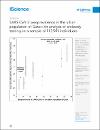SARS-CoV-2 seroprevalence in the urban population of Qatar: An analysis of antibody testing on a sample of 112,941 individuals

View/
Publisher version (Check access options)
Check access options
Date
2021-06-25Author
Peter V., CoyleChemaitelly, Hiam
Ben Hadj Kacem, Mohamed Ali
Abdulla Al Molawi, Naema Hassan
El Kahlout, Reham Awni
Gilliani, Imtiaz
Younes, Nourah
Al Anssari, Ghada Ali A.A.
Al Kanaani, Zaina
Al Khal, Abdullatif
Al Kuwari, Einas
Butt, Adeel A.
Jeremijenko, Andrew
Kaleeckal, Anvar Hassan
Latif, Ali Nizar
Shaik, Riyazuddin Mohammad
Abdul Rahim, Hanan F.
Nasrallah, Gheyath K.
Yassine, Hadi M.
Al Kuwari, Mohamed Ghaith
Al Romaihi, Hamad Eid
Al-Thani, Mohamed H.
Bertollini, Roberto
Abu-Raddad, Laith J.
...show more authors ...show less authors
Metadata
Show full item recordAbstract
The study objective was to the assess level of detectable severe acute respiratory syndrome coronavirus 2 (SARS-CoV-2) antibodies in the urban population of Qatar. Antibody testing was performed on residual blood specimens for 112,941 individuals (∼10% of Qatar's urban population) attending for routine/other clinical care between May 12 and September 9, 2020. Seropositivity was 13.3% (95% confidence interval [CI] = 13.1–13.6%) and was independently associated with sex, age, nationality, clinical care encounter type, and testing date. Median optical density (antibody titer) among antibody-positive persons was 27.0 (range = 1.0–150.0), with higher values associated with age, nationality, clinical care encounter type, and testing date. Seropositivity by nationality was positively correlated with the likelihood of having higher antibody titers (Pearson correlation coefficient = 0.85; 95% CI = 0.47–0.96). Less than two in every 10 individuals in Qatar's urban population had detectable antibodies against SARS-CoV-2, suggesting this population is still far from herd immunity and at risk of subsequent infection waves. Higher antibody titer appears to be a biomarker of repeated exposures to the infection.
Collections
- Biomedical Research Center Research [833 items ]
- Biomedical Sciences [845 items ]
- COVID-19 Research [853 items ]
- Public Health [514 items ]


